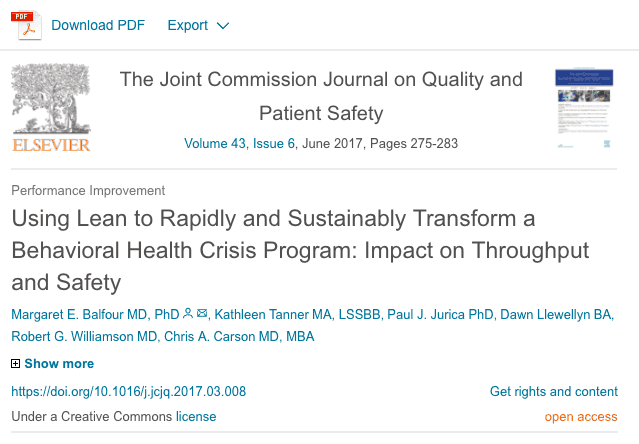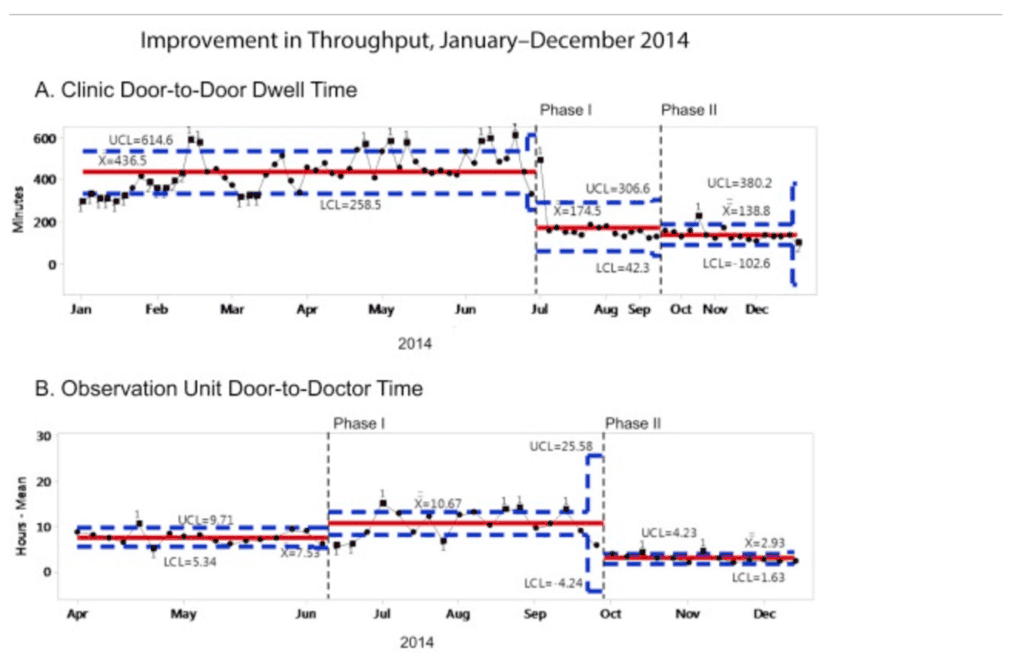
My guest today for episode #284 of the podcast is Dr. Margaret (Margie) Balfour, the lead author of an article, published in the The Joint Commission Journal on Quality and Patient Safety, titled “Using Lean to Rapidly and Sustainably Transform a Behavioral Health Crisis Program: Impact on Throughput and Safety.”
Today, we're talking about that article, the important improvement work that led to it, and her belief, as stated in the article that “Lean methods can positively affect safety and throughput and are complementary to patient-centered clinical goals in a behavioral health setting.”
Dr. Balfour is the VP for Clinical Innovation and Quality at Connections Health Solutions, one of the largest providers of psychiatric emergency care in Arizona, and an Assistant Professor of Psychiatry at the University of Arizona.
Dr. Balfour received her MD and PhD in Neuroscience from the University of Cincinnati and completed residency and a fellowship in Public and Community Psychiatry at the University of Texas Southwestern Medical Center in Dallas. You can read her full bio further down in the post.
Streaming Player (Run Time 42:46)

For a link to use for this episode, refer people to www.leanblog.org/284.
For earlier episodes of my podcast, visit the main Podcast page, which includes information on how to subscribe via RSS, through Android apps, or via Apple Podcasts. You can also subscribe and listen via Stitcher.
The Journal Article:
Today, we're talking about her article, published in the The Joint Commission Journal on Quality and Patient Safety… the article is titled Using “Lean to Rapidly and Sustainably Transform a Behavioral Health Crisis Program: Impact on Throughput and Safety.”

Topics and Questions in the Episode:
- Please tell the listeners about your professional background…
- How and when did you first get exposed to Lean?
- How did you come to think to try this approach to improvement?
- I love how you emphasize (I correctly) that Lean should focus on quality and safety, not just flow or throughput… why do you think there are misunderstandings out there in other health systems?
- What was the problem or scenario that you faced that required improvement?
- What happened when you got input from staff via town-hall meetings and rounding?
- Talk through the process of defining outcome measures
- Timely, safe, least restrictive, partnership
- What was the approach for understanding the current state, the ideal state, and the gaps?
- What were your initial interventions? And the outcomes?
- The second phase?

- How did you work through staff being “initially skeptical?”
- What were some of the management system changes?
- Daily huddles
- Shift leads
- Problem solving
- You state pretty definitively that Lean methods apply in healthcare… What were some of the unique factors in behavioral health?
- Do you think it would surprise some that Lean methods lead to MORE individualized care?
- Any final lessons learned or advice for others in healthcare leadership positions?
PDF Episode Summary
You can download a 4-page PDF summary of this post:
- Low-res PDF (for reading on screen)
- High-res PDF (for printing)

Margie Balfour, MD, PhD Bio:
Dr. Margaret (Margie) Balfour is the VP for Clinical Innovation and Quality at Connections Health Solutions, one of the largest providers of psychiatric emergency care in Arizona, and an Assistant Professor of Psychiatry at the University of Arizona. She joined Connections in April 2014 and is responsible for managing clinical operations at the Crisis Response Center in Tucson, AZ, where she led major process improvements resulting in significant decreases door-to-doctor time, injuries and other key performance indicators. In addition, she developed a quality improvement framework across the programs and facilities within the whole organization, and under her leadership Connections has gained national recognition in the field of performance measurement in crisis services.
Prior to joining Connections, Dr. Balfour was involved with quality improvement initiatives in other public behavioral health settings. She led major improvements at Parkland, the public-safety net health system for Dallas County, with a special emphasis on emergency psychiatric services and development of integrated care models to address the behavioral health needs of patients throughout the hospital system, and was instrumental in helping the hospital system regain CMS compliance. She also worked with ValueOptions to lead the development of a program for the highest utilizers of services in north Texas, and used both data analyses and the individual experiences of these members to inform opportunities for improvement for the system as a whole.
Dr. Balfour received her MD and PhD in Neuroscience from the University of Cincinnati and completed residency and a fellowship in Public and Community Psychiatry at the University of Texas Southwestern Medical Center in Dallas.
Dr. Balfour is a national leader in both quality improvement and recovery-oriented care. She serves on the board of directors of the American Association of Community Psychiatrists and The American Association for Emergency Psychiatry and is a member of the American Psychiatric Association Council on Quality of Care. She is the 2017 recipient of the National Council for Behavioral Health Doctor of the Year Award.
Please scroll down (or click) to post a comment. Connect with me on LinkedIn.
Let’s work together to build a culture of continuous improvement and psychological safety. If you're a leader looking to create lasting change—not just projects—I help organizations:
- Engage people at all levels in sustainable improvement
- Shift from fear of mistakes to learning from them
- Apply Lean thinking in practical, people-centered ways
Interested in coaching or a keynote talk? Let’s start a conversation.







![When Was the Last Time a Leader Around You Admitted They Were Wrong? [Poll]](https://www.leanblog.org/wp-content/uploads/2025/07/Lean-Blog-Post-Cover-Image-2025-07-01T212509.843-100x75.jpg)

